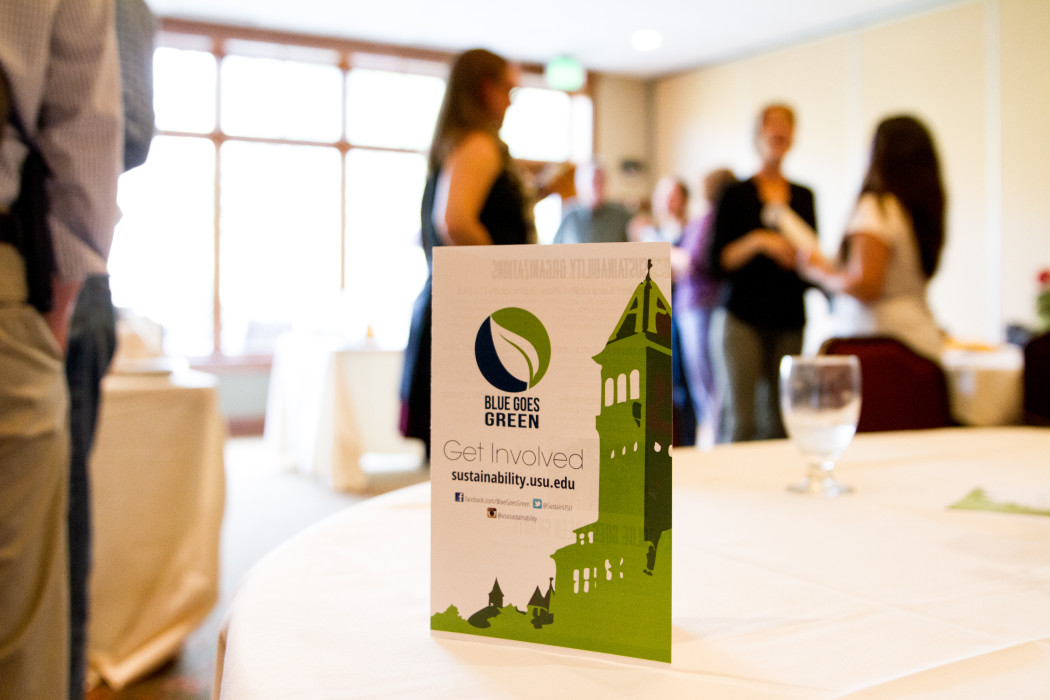USU professors integrate sustainability into curriculum
Thanks to a group of professors and students focused on integrating sustainability into the curriculum, students at Utah State University can expect to see changes in the way their classes are taught.
This summer, a group of USU faculty attended a workshop designed to help them integrate sustainability concepts and planetary thinking, or environmentally conscious thinking, into curriculum. These professors met at a poster session Tuesday to discuss the changes they were able to make and the results.
“Everybody who leaves the university needs to be able to think about the way their life interacts with the resources we have on this planet,” said Alexi Lamm, the university’s sustainability coordinator.
Lamm said the idea behind the planetary thinking initiative was to provide faculty with resources to integrate sustainability into course material.
This initiative works toward fulfilling the American College and University Presidents’ Climate Commitment, which university president Stan Albrecht signed in 2007. The agreement also committed the university to achieving carbon neutrality by 2050.
“Our mission is this education and service mission,” Lamm said, “so there are many important places for sustainability. But if we did it nowhere else, it should be [in the curriculum]. That’s what we do.”
According to Lamm’s calculations, the 17 faculty members who participated in the initiative will reach a collective audience of 2,250 students.
Nick Flann, an associate professor of computer science who helped organize the initiative, said he hoped the scope of this collective audience would help spread ideas throughout the community beyond USU.
“Things like this are necessary,” said Forrest Schoessow, a graduate student studying geography. “There is trickle-down effect in education and whatever happens here, it’s going to follow in the valley, and more people will start paying attention.”
Idalis Villanueva, an assistant professor who designed her introductory engineering course around ideas of ethics and sustainability, said she felt her efforts had worked to increase students’ awareness.
“I think students are realizing that both ethics and sustainability are part of their value system as a professional,” Villanueva said.
Laura Gelles, a graduate research assistant who helps teach the class, said she was surprised by how well students responded to the curriculum changes.
“The answers [students] gave were just kind of perfect answers that I didn’t expect from Utah students,” Gelles said, “because when you force feed them sustainability, they’re like, ‘No, don’t give me that, that’s like hippie, liberal, liberal arts kind of stuff.”
Gelles said students were more likely to respond well to the idea of sustainability when it was presented as a demand by the professional societies they would be beholden to as future engineers.
The potential for sustainability concepts in the curriculum extends beyond teaching students about professional responsibility.
Lawrence Culver, a USU history professor, proposed a new course examining the history of the built environment which will “take environmental sustainability as its central focus,” according to the proposed syllabus.
Susan Cogan, an assistant professor of history, said she revised her general education course, Foundations of Western Civilization, to focus more on these concepts as well. For her part, Cogan plans on asking students to consider concepts like political and religious sustainability.
“I’ve told them that my idea is to get them thinking about sustainability in a whole bunch of different forms,” Cogan said.
Working with differents ideas about sustainability was central to the creation of The Crossroads Project, a collaborative “performance experience” which endeavors to explore global sustainability through a combination of art, music and science.
Rebecca McFaul, a professional practice associate professor at the Caine College of the Arts and a member of the Fry Street Quartet, collaborated on the project. In celebration of the quartet’s album release, McFaul said it is launching the #makeityours and #makeityoursusu social media campaign.
The campaign invites students and community members to participate in a month-long examination of sustainability. Starting Sept. 20, students can submit photos of themselves that answer the prompt “I’m working toward a more sustainable future by…” via #makeityours or #makeityoursusu. There will be a drawing at the end of October for prizes.
@alyssarbrts


This is awesome to see happening in Utah!